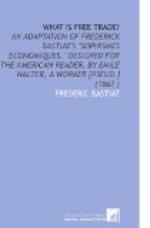As for you, you form a theory, in the unfavorable sense of the word. You imagine, you invent—proceedings which are not sanctioned by the practice of any living man under the vault of heaven—and then you call to your assistance constraint and prohibition. You need, indeed, have recourse to force, since, in wishing that men should produce that which it would be more advantageous to them to buy, you wish them to renounce an advantage; you demand that they should act in accordance with a doctrine which implies contradiction even in its terms.
Now, this doctrine, which, you argue, would be absurd in individual relations, we defy you to extend, even in speculation, to transactions between families, towns, counties, states. By your own avowal, it is applicable to international relations only.
And this is why you are obliged to repeat daily: “Principles are not in their nature absolute. That which is well in the individual, the family, the county, the state, is evil in the nation. That which is good in detail—such as, to purchase rather than to produce, when purchase is more advantageous than production—is bad in the mass. The political economy of individuals is not that of nations,” and other rubbish, ejusdem farinae. And why all this? Look at it closely. It is in order to prove to us that we, consumers, are your property, that we belong to you body and soul, that you have an exclusive right to our stomachs and limbs, and it is for you to nourish us and clothe us at your own price, however great may be your ignorance, your rapacity, or the inferiority of your position.
No, you are not men of practice; you are men of abstraction—and of extraction!
CHAPTER XIV.
CONFLICT OF PRINCIPLES.
There is one thing which confounds us, and it is this:
Some sincere publicists, studying social economy from the point of view of producers only, have arrived at this double formula:
“Governments ought to dispose of the consumers subject to the influence of their laws, in favor of national labor.”
“They should render distant consumers subject to their laws, in order to dispose of them in favor of national labor.”
The first of these formulas is termed protection; the latter, expediency.




